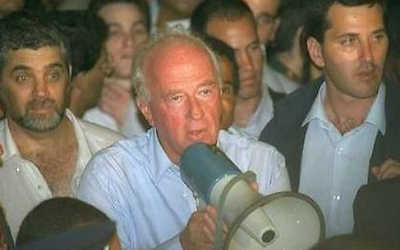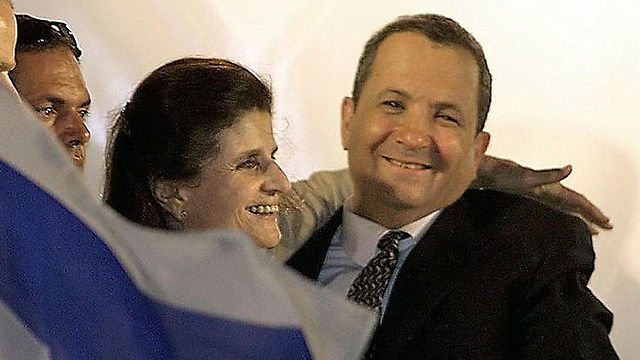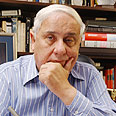What do the prime ministerial candidates do on election night? Bite their nails? Pace back and forth in their living rooms like caged lions, as the saying goes? Dance and sing, or age several years in an instant? How and with whom do they spend the most important night of their lives?
I had the great privilege to be a part of that night of joy for two individuals who served as prime ministers of Israel, Yitzhak Rabin and Ehud Barak. Here's what happened when the clocks struck 10 and the first exit polls were flashed on the television screens.
Yitzhak Rabin:The apartment balconies on Rav Ashi Street in Ramat Aviv burst into light and heads popped out of every apartment window within a minute of the release of the first exit polls. The Rabin family was sitting in the living room.
"You won't believe it," Leah Rabin said as we entered. "When the exit polls appeared on the television, we heard loud roars of joy from all the apartments."
Her face was aglow, as were those of the rest of the household. They were sitting in a circle, close to the walls, facing the television. Sitting on one of the chairs was the hero of the night, Yitzhak Rabin. His usually grumpy face, too, showed a slight glow, a touch of joy perhaps.

Masses immediately gathered at the Dan Hotel on Hayarkon Street, the designated location for the victory celebration. Two individuals there kept Rabin abreast of things – Shimon Sheves, his close aide, and MK Haim Ramon. One said: Don't head out until we get the actual results. The other said: The people can't wait any longer. Go!
The scenes from the hotel eventually persuaded him to leave the house. The crowd was screaming, singing and rejoicing; but what prompted his decision was the image of Shimon Peres being greeted on the stage by a loud ovation. "You'd think he won," someone remarked. Yitzhak and Leah "switched on."
The convoy arrived at the Dan Hotel in no time. The television in the pre-booked suite was carrying images of the happenings downstairs. "The crowd wants you there," Rabin kept hearing on his phone. Ramon wasn't convinced. "The victory is only in the exit polls for now," he said.
And Rabin – who remembered the embarrassment suffered by Peres in the previous election, when he went out to face the joyous crowds and was presented as "the next prime minister" but ended up losing – was deterred. The minutes went by; and there on the stage stood Shimon Peres, Shimon Peres talking, Shimon Peres being congratulated. Shimon Peres. Shimon Peres.
And then Ramon handed over the initial actual results. They didn't yet point to a clear-cut victory, but Rabin rose from his chair and moved towards the door. On stage a few minutes later, when he declared, "I will steer" and "I will appoint the ministers," it was a response to a single individual in the crowd, the person he viewed that night as his true and one and only rival – Simon Peres.
And the rest is history.
Ehud Barak: Sitting in the suite at the Dan Hotel were his then-wife, Nava, the three girls, the son-in-law and the loyal brother-in-law, Doron Cohen. Barak's face, when he entered the suite, showed no emotion. Not even a spark of joy, and certainly not one of victory. He hugged Nava, his daughters and his brother-in-law, and the son-in-law took pictures. At the same time, he also said: "Everybody out." Astonishment. People had worked day and night for his victory, and they were waiting for a word of gratitude from him, an embrace, a handshake, anything. But nothing. Everybody out.
Everyone went out into the corridor. We stayed there alone with Barak when suddenly Nava's mother showed up from Tiberias. Barak was brief and purposeful. He hugged her and glanced for a moment at the TV, which didn't stop showing images of masses of people gathering in Rabin Square. He ate another sandwich and a cookie and retrieved some papers from his jacket pocket – the draft of the address he was about to give.

Everyone was waiting for him, but Barak was in no rush. He reviewed the contents of his speech again and again. And then my cellphone rang in my pocket. The silence was broken. On the line was one of Israel's greatest friends in the White House. He didn't have Barak's number. He only had mine. "The president of the United States would like to speak to the prime minister," he said. I handed my cellphone to Barak. "President Clinton wants to talk to you," I said.
"Not now, not now," Barak responded. "Have you lost your mind?" I asked. "Ok, then," Barak replied, and reluctantly took hold of my cellphone. Clinton congratulated him.
Meanwhile, talk of angry party activists leaving the hotel began filtering into the suite. Barak kept his eye on the television images and saw the tens of thousands of people packing Rabin Square. "Ehud Barak is on the way," the loudspeakers blared – and he's still in the suite. Everyone urged him to leave. Barak was reluctant, to say the least. "You have to," he was told.
He finally relented. He went down to the activists at the hotel and then, with the hour very late, and after he was told that many people are already leaving Rabin Square, he went out to face them, to "the dawning of a new day."
I went out into the hotel corridor. Walking down the corridor towards me were members of the VIP protection unit. They had come on foot from the nearby Hilton Hotel, where just a few minutes earlier they were providing security for outgoing prime minister Benjamin Netanyahu.
The dawn was about to break. The revolution was complete.
















